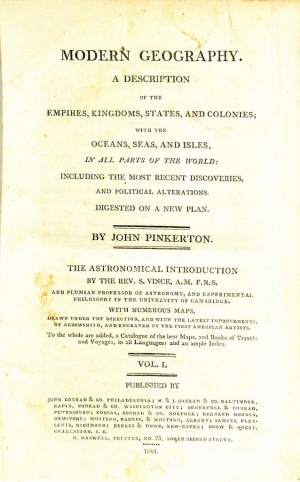Modern Geography: A Description of the Empires, Kingdoms, States, and Colonies with the Oceans, Seas, and Isles; in All Parts of the World: Including the Most Recent Discoveries, and Political Alterations, Digested on a New Plan
by John Pinkerton
| Modern Geography | |
|
Title page from Modern Geography, volume one, George Wythe Collection, Wolf Law Library, College of William & Mary. | |
| Author | John Pinkerton |
| Published | Philadelphia: Published by John Conrad & Co. ... |
| Date | 1804 |
| Language | English |
| Volumes | 2 volume set |
| Desc. | 8vo (23 cm.) |
| Location | Shelf C-3 |
John Pinkerton (1758 – 1826) was a Scottish author, historian, and poet who first gained prominence for compiling collections of Scottish poetry. After his first publication in 1781, Pinkerton gained notoriety as a literary imposter for inserting parts of his own work into the poems of antiquity. However, Pinkerton redeemed himself through his 1786 publication Ancient Scotish Poems, which contained previously unpublished Scottish poetry and a confession of his earlier deception. Pinkerton later authored works involving geography, history, numismatics, and theater.
Despite his literary successes, Pinkerton remained controversial for his unorthodox views on religion and morality. His tumultuous private life included a series of failed relationships and marriages. Such controversy kept Pinkerton from advancing his social standing and wealth, and he left London for Paris in 1815. Pinkerton spent the rest of his life in Paris, where illness prevented him from continuing to publish. He died in 1826. [1]
Pinkerton's three-volume Modern Geography detailed global geography as known in the early nineteenth century. Pinkerton included Europe, Asia, the Americas, and Africa as the four major continental groups, and he detailed specific countries within each group. For those countries, Pinkerton included information about four different geographical aspects: historical or progressive geography, political geography, civil geography, and natural geography.[2]
Modern Geography was first published in 1802 and became "instantly popular." High sales of the book led to second and third editions of the work, while abridged versions of Modern Geography went through multiple editions as well.[3] Eventually, the book was adapted and translated into French and Italian.[4] The book was hailed by different reviewers as "a standard of excellence in animated description" and "a monument undoubtedly of singular industry, of extensive knowledge, and of discriminating judgment."[5]
Pinkerton's motivation for writing Modern Geography was to be profitable, as he noticed that current "geography books in use left room for a new and better work."[6] To prove to prove to publishers that a new work on geography would be both necessary and profitable, Pinkerton wrote a proposal for publishers titled "Ideas on a New System of Geography." In the proposal, Pinkerton attacked the widely used geographical works of author William Guthrie for poor arrangement, factual errors, and failure to cite authorities. Pinkerton subsequently detailed his own plans on organization and content in the proposal, and his "hasty and imperfect sketch" would later be realized in the published volumes of Modern Geography.[7]
Evidence for Inclusion in Wythe's Library
Listed in the Jefferson Inventory of Wythe's Library as "Pinkerton’s geography. 2.v. 8vo." This was one of the titles kept by Thomas Jefferson. In 1815, Jefferson sold a copy of John Pinkerton's Modern Geography to the Library of Congress. Both the Brown Bibliography[8] and George Wythe's Library[9] on LibraryThing include the 1804 edition of Pinkerton's work based on Millicent Sowerby's entry in Catalogue of the Library of Thomas Jefferson.[10] While the Jefferson volumes no longer exist to conclusively verify the edition or Wythe's prior ownership, the Wolf Law Library's George Wythe Collection includes the edition recommended by Sowerby.
Description of the Wolf Law Library's copy
Mixed, incomplete set (lacks atlas volume). Volume one bound in contemporary calf. Spine features gilt bands and red morocco, gilt-lettered label and volume number. Includes inscription, "William Taylor's Book 10th Mo 12th 1804" on front free endpaper. Volume two bound in contemporary calf with gilt-ruled spine and red morocco, gilt-lettered label. Gilt volume number. Includes signature "W. Lewis" on front pastedown and title page. Inscription on front free endpaper partially missing. Remnant is "January 26th 1826."
Images of the library's copy of this book are available on Flickr. View the record for this book in William & Mary's online catalog.
Full text
See also
References
- ↑ Sarah Cooper, "Pinkerton, John (1758-1826)," Oxford Dictionary of National Biography (Oxford University Press, 2004- ), accessed March 27, 2015.
- ↑ O.F.G. Sitwell, "John Pinkerton: An Armchair Geographer of the Early Nineteenth Century," The Geographical Journal 138, no. 4 (1972): 474.
- ↑ Patrick O’Flaherty, Scotland’s Pariah: The Life and Work of John Pinkerton, 1758-1826 (Buffalo, NY: Toronto University Press, 2015), under "Paris Interlude, 1802-1805."
- ↑ Cooper, "Pinkerton, John."
- ↑ O'Flaherty, Scotland’s Pariah, under "Paris Interlude, 1802-1805."
- ↑ A.A. Wilcock, "'The English Strabo': The Geographical Publications of John Pinkerton," Transactions of the Institute of British Geographers, no. 61 (1974): 36.
- ↑ Ibid., 38-39.
- ↑ Bennie Brown, "The Library of George Wythe of Williamsburg and Richmond," (unpublished manuscript, May, 2012, rev. May, 2014) Microsoft Word file. Earlier edition available at: https://digitalarchive.wm.edu/handle/10288/13433.
- ↑ LibraryThing, s.v. "Member: George Wythe," accessed on November 11, 2013.
- ↑ E. Millicent Sowerby, Catalogue of the Library of Thomas Jefferson, (Washington, D.C.: The Library of Congress, 1952-1959), 4:89-90 [no.3826].

